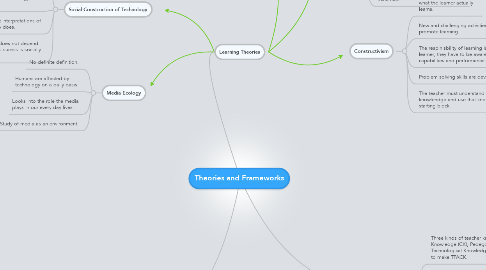Theories and Frameworks
저자: Allysa Best

1. Conectivism
1.1. Learner's have unlimited acess to knowledge, they just have to use the resources available to find it.
1.2. Connections and meanings between activities and ideas is where learning takes place.
1.3. New information is always available, it is important for the learner to become well informed so as to weed out the good information from the bad.
1.4. The teacher is a guide to give the learner access to technology and information to form connections.
2. Media Ecology
2.1. No definite definition.
2.2. Humans are affected by technology on a daily basis.
2.3. Looks into the role the media plays in our every day lives.
2.4. Study of media as an environment.
3. Social Construction of Technology
3.1. Technology does not affect humans, but rather technology is shaped by humans.
3.2. To understand technology, we must understand the social context in which that technology is used first.
3.3. Many different interpretations of what it actually does.
3.4. The success of a technology does not depend on how "good" it really is, it's sucess is socially determined.
4. Learning Theories
5. Philosophy of Teachnology
5.1. A teacher's personal values about incorporating and using technology in their classrooms and teaching methods.
5.2. Not all teachers develop or use a philosophy of teachnology.
5.3. Includes many technology uses as well as a PLN, realy any way that technology can be incorporated into the classroom.
6. Constructivism
6.1. Prior knowledge influences what the learner actually learns.
6.2. New and challenging activities promote learning.
6.3. The respinisbility of learning is that of the learner, they have to be aware of their own capabilities and performance.
6.4. Problem solving skills are developed.
6.5. The teacher must understand the learner's prior knowlendge and use that knowledge as a starting block.
7. Cognitive Load
7.1. Long term memory is the stored and factual knowledge
7.2. Working memory involves our thinkging and awareness, it is the information coming in that may end up stored in LTM.
7.3. If the working momory is overloaded there is a disruption in the learning process.
7.4. Extraneous load is created through how information is delivered.
7.5. Intrinsice load is created through the learning task.
7.6. Germane load is created through learning and results in the formation of schemas.
8. TPACK
8.1. Three kinds of teacher knowledge; Content Knowledge (CK), Pedegogical Knowledge (PK) and Technological Knowledge (TK). All of these combine to make TPACK.
8.2. To effectively integrate technology in a classroom you must take into consideration the other aspects of TPACK as well.
8.3. The way every teacher incorporates TPACK into the classroom is unique, there is no one right way.
8.4. Every teacher builds there TPACK tools throughout their teaching careers.


